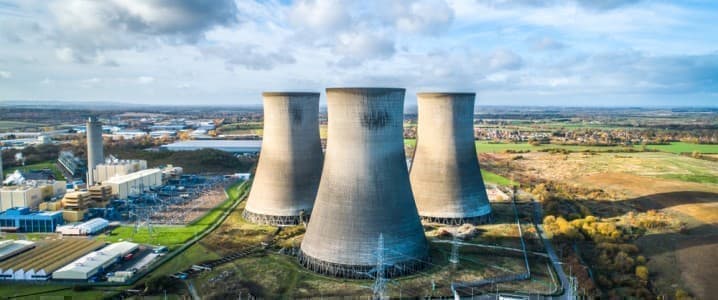Between 2009 and 2019, global consumption of renewable energy grew at an annual average of 13.4%. Over that time, renewable energy consumption grew from 8.2 exajoules (EJ) globally to 28.8 EJ.
Yet, global carbon dioxide emissions rose by more than 4 billion metric tons per year during that time, reaching an all-time high in 2019.
The reason for this is that overall global energy consumption — while growing at an average annual rate of only 1.9% — rose by 92 EJ from 2009 to 2019. Renewables are growing at a much faster rate, but it will take decades at the current growth rates before renewables can make a serious dent in global carbon dioxide emissions.
That’s why nuclear power could play a critical supporting role in reining in global carbon dioxide emissions. Yet, nuclear power is concentrated in a handful of countries, and very few are growing their nuclear energy production.

France recently announced it would build up to 14 new nuclear reactors by 2050. This marked a policy reversal, as President Emmanuel Macron had promised four years ago to move away from nuclear power and close 12 nuclear reactors. But the country got a reality check this winter when some of its nuclear power plants went offline, and it was forced to turn to coal as a result.
France will construct six new nuclear reactors, and study the possibility of an additional eight. “Given the electricity needs, the need to also anticipate the transition and the end of the existing fleet, which cannot be extended indefinitely, we are going to launch today a program of new nuclear reactors,” Macron said.
But the vast majority of new nuclear power construction over the next five years will take place in the Asia Pacific region. This is important, because this is the area of the fastest growth in carbon dioxide emissions.
Related: Oil Prices Jump As OPEC+ Sticks With 400,000 Bpd Output Hike
China, already a major nuclear power, has nearly 20 new nuclear reactors that will be under construction within the next five years. India, which is one of the world’s largest and fastest-growing energy consumers, isn’t yet a major nuclear power producer. However, with eight new nuclear reactors that will commence construction by 2027, it is making a firm commitment toward becoming one.
More nuclear power in China and India could help supply growing energy demands without a continued explosion in the region’s carbon dioxide emissions. In fact, it may be the only solution that can reasonably achieve this objective.
In the U.S. — the world’s largest nuclear power producer — nuclear power generation has been flat for the past two decades. But that should change this year with the commissioning of Southern’s Vogtle Units 3 and 4. These will be the first new nuclear units built in the United States in more than three decades.
There are admittedly still a lot of headwinds for the industry in the wake of previous nuclear disasters like Chernobyl in 1986 and the 2011 Fukushima nuclear disaster. Another major disaster has to be avoided, because it would be a huge setback for this critical tool for producing firm, scalable power with a low carbon footprint.
But, with the current slate of nuclear plants under construction, there is at least some hope that nuclear is regaining acceptance, and can make a growing contribution toward arresting the growth of global carbon emissions.
By Robert Rapier
More Top Reads From Oilprice.com:
- Exxon, Chevron Eye Major Boost In Permian Oil Production
- Oil Prices Jump As OPEC+ Sticks With 400,000 Bpd Output Hike
- Oil Prices Fall As Iran Negotiator Says Deal Is “Closer Than Ever”



















Still the impact of nuclear power on rising energy demand will always be very limited because the majority of countries of the world neither have access to nuclear technology nor the ability to finance it.
And while nuclear energy can to some extent help rein in global CO2 emissions, its worst and most costly downside is how to dispose safely of the millions of tons of radioactive waste and the horrendous costs of de-commissioning nuclear plants estimated to be much higher than the cost of building a brand new plant. Germany is a case in point. This will always slam the brakes on extensive nuclear plant expansion.
In my opinion, the most practical and cost-effective recipe for addressing rising energy demand is adequate investment in both renewables and also oil and gas. The more renewables account for global electricity generation, the less natural gas and coal will be needed until we reach a stage where the bulk of electricity generation around the world is renewable electricity.
Still, oil and gas will continue to drive the global economy throughout the 21st century and probably far beyond. EVs will never ever prevail over ICEs. Moreover, the notions of net-zero emissions and total global energy transition are illusions.
Dr Mamdouh G Salameh
International Oil Economist
Visiting Professor of Energy Economics at ESCP Europe Business School, London